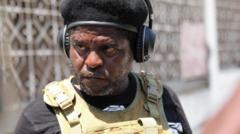President Nayib Bukele of El Salvador stated he will not allow the return of Kilmar Ábrego García, an individual deported in error by the US government. The announcement comes amid a White House meeting with Donald Trump, as the two leaders strengthen their cooperative ties on immigration issues. The US Supreme Court recently mandated that the Trump administration must facilitate the return of Ábrego García, who had previously been granted deportation protection due to family and legal status. Despite this, Trump claimed the responsibility to return him lies with El Salvador's government, while applauding Bukele's approach to managing US deportees, particularly suspected gang members.
El Salvador's Bukele Refuses to Return Misplaced Deportee Despite Supreme Court Ruling

El Salvador's Bukele Refuses to Return Misplaced Deportee Despite Supreme Court Ruling
In a significant diplomatic exchange, El Salvador's President Nayib Bukele announced he will not accept the return of Kilmar Ábrego García, who was erroneously deported from the US, during talks with ex-President Trump in Washington.
Ábrego García, currently held in a mega-prison notorious for human rights abuses, is alleged by the US government to be affiliated with gangs, a claim his lawyer disputes. The juxtaposition of US internal policies with El Salvador's tight immigration agreements raises significant concerns among advocates, particularly as unsafe conditions in El Salvador's prisons come to light. As the situation unfolds, Bukele benefits politically and financially from his alignment with the Trump administration while critics voice their worries regarding human rights implications.
Ábrego García's family, including his wife who is a US citizen, expressed deep frustration over the political maneuvering impacting his life, highlighting the entrenched emotional and social consequences tied to immigration policies. As deportations of alleged gang members continue, the arrangement between the two nations complicates the already challenging realm of immigration, with legal and ethical ramifications still being evaluated.
In summary, while US deportation practices continue to evolve, the implications and human cost associated with these actions remain critically contentious.
Ábrego García's family, including his wife who is a US citizen, expressed deep frustration over the political maneuvering impacting his life, highlighting the entrenched emotional and social consequences tied to immigration policies. As deportations of alleged gang members continue, the arrangement between the two nations complicates the already challenging realm of immigration, with legal and ethical ramifications still being evaluated.
In summary, while US deportation practices continue to evolve, the implications and human cost associated with these actions remain critically contentious.



















